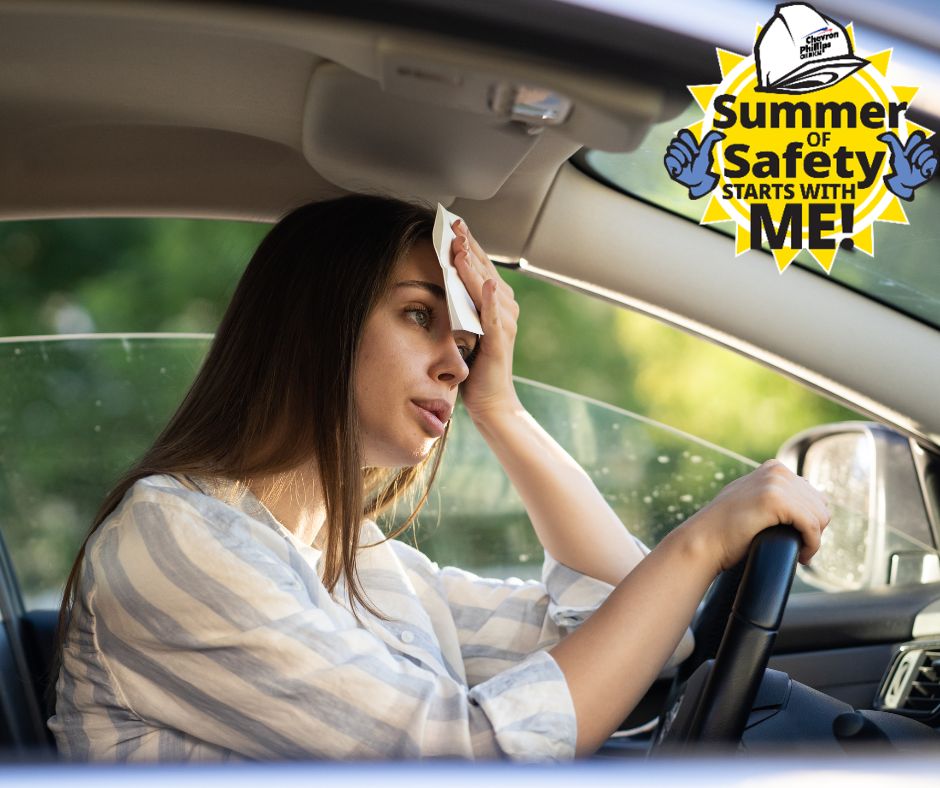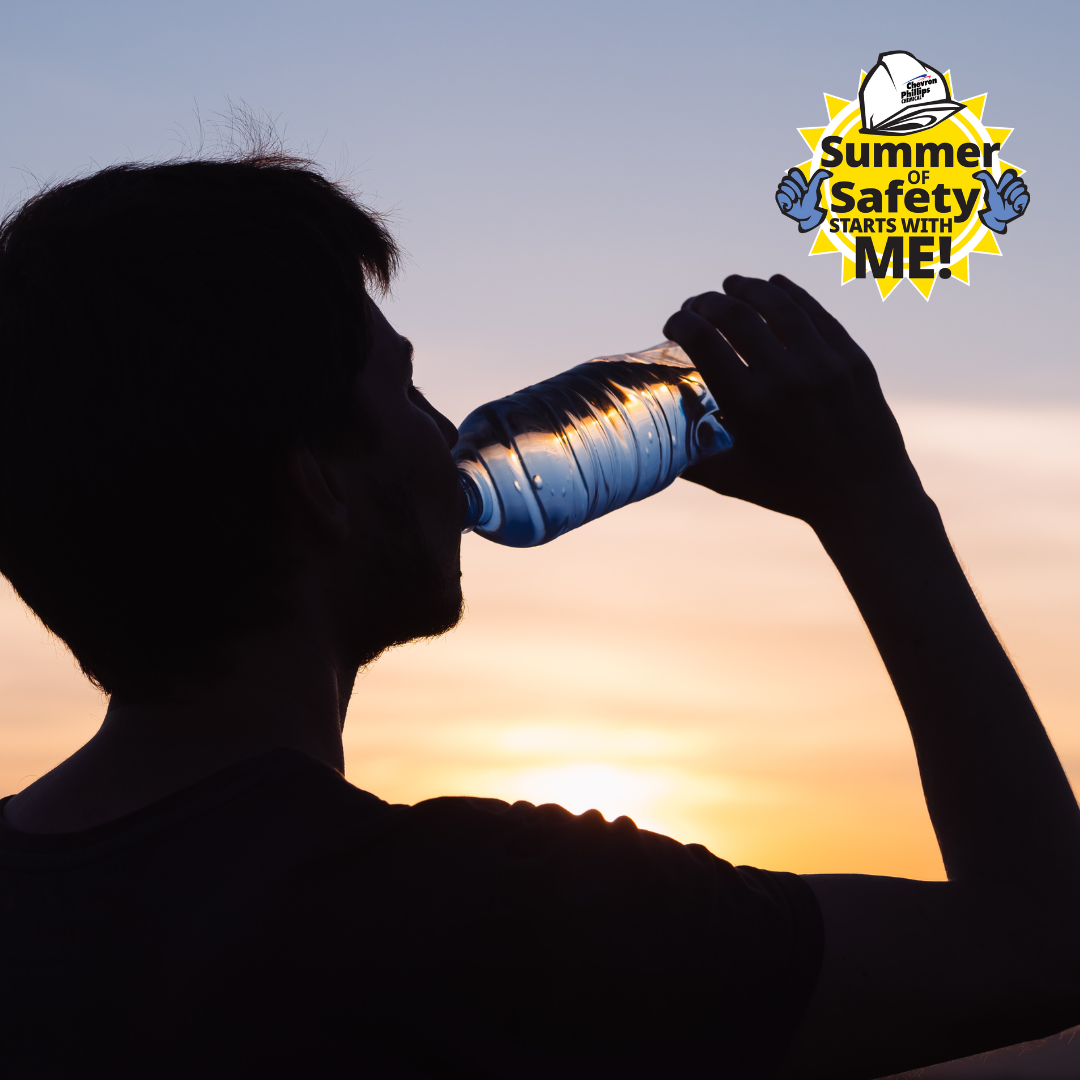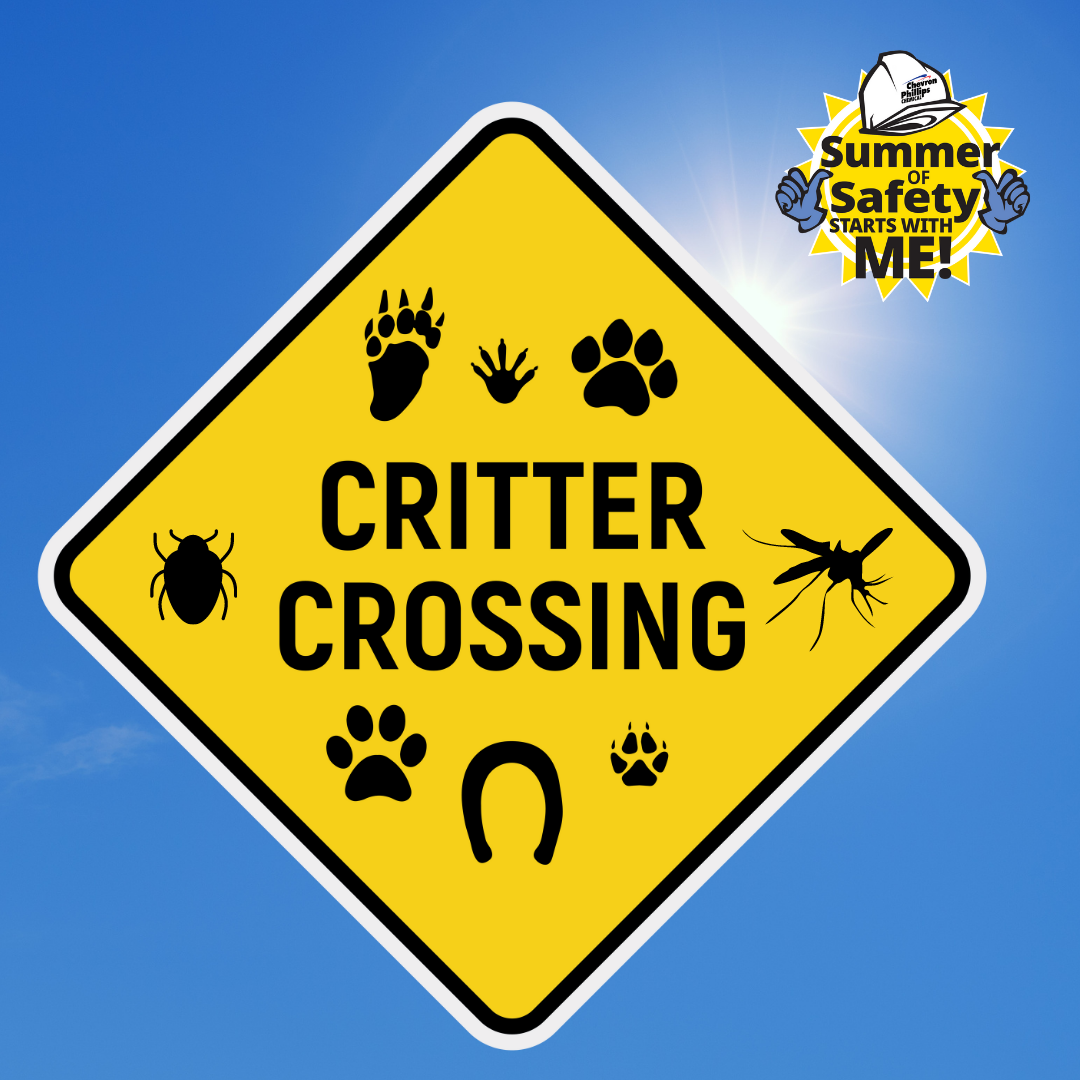Summertime may be when the living is easy, but all that recreation, play and relaxation brings some serious health risks. Chevron Phillips Chemical focuses heavily on workplace and operational safety, yet there’s another important concern at this time of the year: summertime safety.
Summer of Safety is CPChem’s seasonal campaign to bring awareness and information about the potential risks and proactive measures everyone can take to stay healthy and happy this summer.
Prevention is key, and Summer of Safety encourages everyone to prevent sun-related health risks by learning what to watch out for and what to do in advance.
Summer of Safety Tips
- Acclimatization: Give yourself time to get used to the warmer conditions.
- Stay cool and hydrated: Take regular breaks in cool areas and drink lots of water.
- Wear sunscreen: Reduce risk from harmful UV rays with sunscreen, which helps prevent sun damage and skin cancer. Use one with at least a 30 SPF and reapply every two hours.
- Monitor PPE: Safety gear can increase your body temperature. Wear a wide-brimmed hat, sunglasses, long-sleeved shirts and long pants to provide a barrier to sun damage.

Look Before You Lock
As temperatures across the country continue to escalate above average highs, it is more important than ever to understand the heat effects on children. Infants and young children are particularly sensitive to the effects of extreme heat and must rely on others to keep them safe. When left in a hot vehicle, a young child’s body temperature can increase three to five times more quickly than an adult.
937 children have died due to pediatric heatstroke since 1998. All these deaths could have been prevented.
Create a Routine
- Make it a routine to open the back door of your car every time you park.
- If you are driving a child, put something you need at the end of your destination in the back seat so you will open the door: a cell phone, employee badge, handbag, or other item you need to keep with you.
- Ask your babysitter or childcare provider to call you if your child hasn’t arrived as scheduled.
- Keep a stuffed animal in the child’s seat as a reminder when the child is in the back seat.
- Set the alarm on your cell phone or computer calendar as a reminder to drop your child off at childcare. Remember to make the alarm song/sound different from all other alert sounds on your device.
- If you have a change in routine, such as your spouse or parent dropping your child off at childcare, make sure you and the other person communicate to confirm the drop-off was made.

National Hydration Day-June 23, 2023
National Hydration Day was created in honor of late football coach Victor Hawkins, who invented a special hydrating mouthguard to keep his players healthy on the field.
Hydration Facts
- Water helps regulate body temperature, so staying hydrated on hot days protects your body.
- About 75% of Americans suffer from chronic dehydration.
- Dehydration can lead to reduced kidney function, kidney stones, hypertension, urinary tract infections, and more.
- Chronic dehydration was a factor in 20% of cases that led to kidney stones.
Stay Hydrated
- Set reminders to regularly hydrate during the day. Visit the Summer of Safety, Hydration Help page for apps available for both iPhone and Android phones.
- Remind everyone you know to stay hydrated. Inform your loved ones and coworkers of the importance of hydration, especially if they are outdoors a lot.
- Don’t like water? Try infused water with fruit like lemon, cucumber, strawberries, cantaloupe etc. Like food prep, make grab and go water bottles for the week.
- Whether you are a casual exerciser, or someone who simply loves to spend time outside in the sun, drinking water is key to avoiding heat stroke, dehydration, and other dangerous issues.

Critter Safety
Most hazards around your home or business are man-made. However, we should not overlook or underestimate the risk from creatures seeking shelter
or food. Now that warm weather is back, you may come into contact with insects or wild animals.
more often.
Stay Safe Around Insects (spiders, wasps, bees)
- Most people experience local minor effects like pain, swelling, itching, and redness around the sting or bite site. In rare cases, a severe
- allergic reaction can occur.
- Wear clean clothing that covers as much skin as possible.
- Avoid using scented soaps, shampoos, deodorants, or cologne/perfume before work.
- Avoid swatting at flying insects. Instead, gently brush them aside or just wait for them to fly away.
- Avoid insect repellants that contain DEET (this chemical weakens the effectiveness of fire-resistant clothing).
Extra Spider Safety
- Watch where you place your hands – these creatures like to stay out of sight.
- If bitten, note the color and shape of the spider to help with treatment.
- Clean up cobwebs as part of routine housekeeping.
Stay Safe Around Wild Animals (snakes, racoons, bats)
- Many animals are attracted to shelters and food and may carry serious diseases. Infections are a common result, and rabies is a concern
- in wild animals as well as wandering dogs and cats. Be aware of the place you decide to stand, sit, or take your break, animals may be
- there. Housekeeping is important, always make sure you properly dispose of all your trash, leaving trash behind is also a reason why
- animals are present on the jobsite.
Extra Snake Safety
- Watch where you place your hands and feet.
- Leave snakes alone. Most people are bitten trying to kill them or to get a better look.
- If bitten, note the color and shape of the snake’s head to help with treatment.
Skin Cancer Prevention
Memorial Day marks the start of summer fun. Start your Memorial Day holiday by observing the National Council on Skin Cancer Prevention urges everyone to take steps to help reduce the rising rates of skin cancer from overexposure to the sun’s ultraviolet rays:
- Stay out of the sun during peak hours: The hours between 10 a.m. to 4 p.m. are when the sun’s rays are strongest.
- Watch the glare: Look out for areas like water and sand that reflect the damaging rays.
- Check the UV index: The Ultraviolet Index measures ultraviolet radiation on a 1 to 11+ scale. Any index over 5 is considered high, and the higher the index, the more sun protection you need.
- Skip tanning: UV radiation, both natural and artificial (such as tanning beds) increases your risk of developing skin cancer, cataracts and corneal burns. It also leads to premature aging and wrinkles.
Skin Cancer Facts
- Skin cancer causes approximately 8,000 deaths per year.
- Melanoma can appear anywhere on the body, even those that are not exposed to the sun.
- Watch for a discolored, misshapen, or uneven mole. Any changes in existing moles should be reported to your dermatologist.
- In 2023 about 97,610 new melanoma cases will be diagnosed. Melanoma causes 75% of deaths from skin cancer.
- Many skin cancers are 95% curable with early detection and treatment. The longer the cancer grows, the greater the risk of death from the disease.
- Ninety percent of melanomas can be spotted without magnification. Examine your own skin between visits to your dermatologist.
